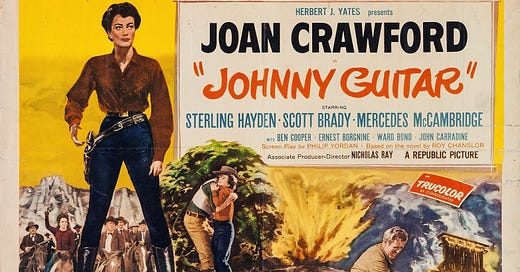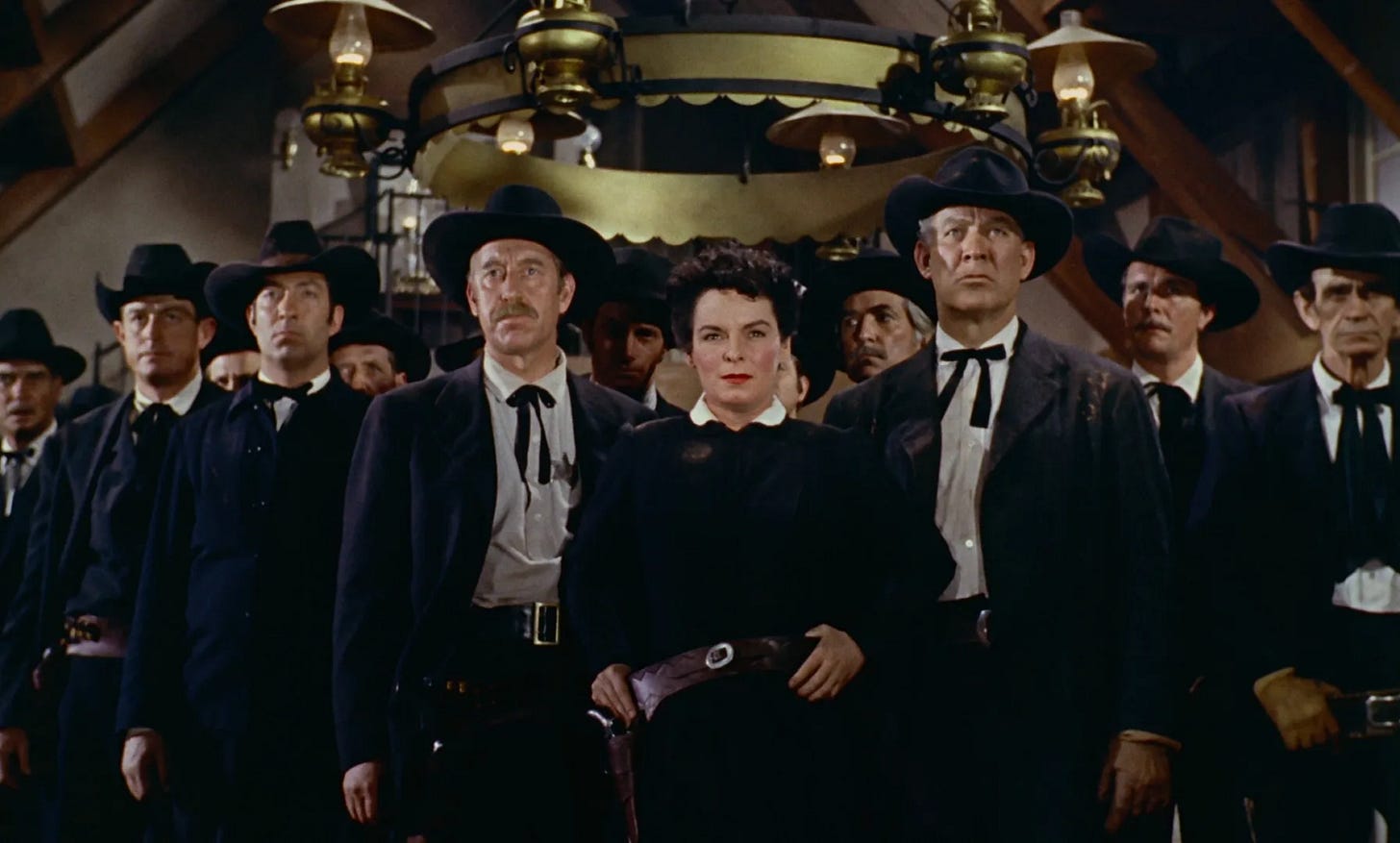Johnny Guitar (1954) (dir. Nicholas Ray)
I know I just wrote about Nicholas Ray's last film too, but I've watched this twice in one week in preparation for a new podcast about Westerns and I couldn't help but make this the next entry.
This might be a strange way to start this particular write-up about one of my favorite “Westerns” of all time, but my fifth viewing made me rethink one line in particular. When Emma says to Vienna at a pivotal moment early in the film, “I am going to kill you,” I couldn’t help but wonder this time around if she actually wanted to say the word “fuck” in place of “kill.”
Yes, of course, these were different times back in the mid-50s. Both women actively lust after strapping, stoic yet confident men with traditional attractions of time and era. Yet I couldn’t help but wonder, what if Emma wanted Vienna for her power, confidence, sultry red lips… her body. So deep down, if she couldn’t have her, no one can. Burn it all down.
Nicholas Ray's astonishing Johnny Guitar (1954) stands as perhaps the most audacious and unconventional Western ever produced during Hollywood's golden age. Though its title suggests a male-centered narrative, this odd fever dream of a film belongs entirely to two towering female performances: the impeccable Joan Crawford as Vienna, the iron-willed saloon owner staking her claim on the frontier, and the operatic Mercedes Mccambridge as Emma Small, a vengeful cattle baron whose “hatred” for Vienna burns with a supernatural intensity. Perhaps that’s why she often sounds possessed (and if you look up Mccambridge’s future voicework credit - this is more than apt).
Where it flourishes most clearly is in the décor and costumes, the vibrant color-coding and the intensity of the actors’ performances. Having virtually begun his career as a student of Frank Lloyd Wright, a member of Wright’s Taliesin Fellowship (a stint that proved short-lived, apparently due in part to Ray’s bisexuality and Wright’s homophobia), Ray shows that influence most strikingly in the interior design of Vienna’s saloon—the integral use of red rock and the shape of the rafters.
Yet for all its modernity, what still makes Johnny Guitar fit Truffaut’s description as the “Beauty and the Beast” of Westerns is its poetry, its feeling of timeless myth — its ordering of all four elements (red rock, air, fire, waterfall) into the shape of a fairy tale or a folk ballad. Given Ray’s experience during the Depression of collecting and recording folk music with Alan Lomax, his brilliant uses of Victor Young’s evocative title tune, which sounds both traditional and contemporary, encapsulate the film’s double-dealing strategy of seeming both historical and up-to-the-minute - Jonathan Rosenbaum
The story centers on Vienna's saloon, built strategically along a future railroad route that promises to bring prosperity and civilization to the Arizona desert. When Emma's brother is killed in a stagecoach robbery, she seizes the opportunity to turn the authorities against Vienna and her associates, including a gang led by the improbably named Dancing Kid (Scott Brady). Into this powder keg rides Johnny "Guitar" Logan (a calm, commanding Sterling Hayden), Vienna's former lover, hired ostensibly to provide entertainment but carrying the weight of their shared past.
Plot machinations matter far less than the film's delirious atmosphere and radical gender inversions. Crawford's Vienna commands her male-staffed saloon with imperious authority, dressed in masculine black garb and quick to reach for her gun. When Johnny arrives, it's he who must prove himself worthy of her, not the other way around. A memorable exchange where she mechanically repeats his desperate pleas for declarations of love inverts typical romantic dynamics while revealing the performative nature of gender roles themselves. Not to mention the soap opera-like score beautifully syncopated with the rhythm of their shared affection.
Mccambridge's Emma emerges as one of cinema's most fascinating antagonists. On first viewing, I thought her performance was almost too stylized. Kind of like Mamet’s radical approach to acting which didn’t initially work for me. Now I’ve grown to appreciate the unusual choices made by Mccambridge. Her wide-eyed crusade against Vienna transcends mere business rivalry or moral righteousness. There's something deeply personal in her vendetta, an unspoken attraction transformed into murderous rage and resentment. Leading a posse of black-clad men (in a brilliant reversal of Western tropes where women typically plead for mercy), Emma's thirst for revenge ultimately proves too extreme even for her male followers.
Ray films this psychological drama in lurid Trucolor, creating a heightened reality where every shade carries symbolic weight. Vienna appears in a pristine white dress at key moments, while Emma shrouds herself in funeral black. Crawford’s lips are redder than red, practically leaping out of the screen. The director's architectural background shows in the striking design of Vienna's saloon, with its dramatic staircases and fortress-like qualities. When the saloon burns, it's like watching a fever breaking or unrequited lust unleashed. There’s one shot in particular (below) that I say ranks as an all-timer for me, as someone who adores cinematography and memorable shots that you don’t see every day. Maybe it’s the refusal to make eye contact that says it all or the artificial skyline and backdrop. It’s… everything that I love.
The film operates on multiple levels: as an allegory for McCarthyism (with its themes of false accusation and mob justice), as a feminist Western (though its politics remain unclear and sometimes contradictory), and as pure heightened melodrama pushed to operatic levels. That it was produced by Republic Pictures, known mainly for cheap programmers, makes its artistic ambitions all the more remarkable.
Critics at the time largely dismissed Johnny Guitar as bizarre and overwrought. As Martin Scorsese said about the film, “these were the kind of people who were expecting another pleasantly mindless ’50s Western, and they were NEVER going to get it.” It is definitely not a conventional approach to a Western to where audiences might’ve been taken aback. Especially given the fact that the film is called Johnny Guitar (a hero’s name if there ever was one), but Joan Crawford’s Vienna is actually the dominant star of the show. However, French New Wave filmmakers, particularly François Truffaut and Jean-Luc Godard, recognized it as a masterpiece of American cinema.
They understood that its artificiality— theatrical dialogue, expressionistic colors, and heightened emotions—was precisely the point. The kind of filmmaking and flavor Ray brought to the intense domestic drama, Bigger Than Life is often on display here. It’s no wonder someone like Pedro Almodovar would be a fan, given the striking color palette and potentially queer undertones (Ray was reportedly bisexual). This isn't a Western attempting realism; it's a Western reimagined as myth and dream.
While the terrain is still mere background to a melodrama of loyalty and desire, the film’s coloring and staging make much more sense when complemented by the vista of towering, sculptured red mesas. Johnny Guitar (Sterling Hayden) rides into town without a gun, but by the time he leaves he has been revealed as the fastest draw in the West. Robert Warshow noted many years ago that the Western hero is the man who knows when not to shoot. The cowboy with the guitar is thus emblematic of the Westerner who knows how to play the part but chooses his roles and when to play them. Johnny Guitar is all about role playing, but it is a dangerous game with high stakes because it turns out that in 1954 America neither playing the guitar nor making movies was “just entertainment.” By the end of the movie, Johnny’s guitar has long been abandoned, but he has gained the love of a woman (Joan Crawford) who is introduced to the audience early in the film, in direct address, as “more a man than a woman.” - Catherine Russell
Sterling Hayden's Johnny Guitar may lend his name to the title, but he's ultimately a supporting player in Vienna and Emma's primal conflict. Which again, completely subverts expectations for audiences, maybe expecting Hayden to take full control. His philosophical musings about how "a man only needs a cup of coffee, and a good smoke" feel like a deliberate deflation of Western machismo. (At one in point in my life, I believed that to be true too). The real action lies in the electric confrontations between Crawford and Mccambridge, whose real-life mutual hatred reportedly spilled over into their performances. I read somewhere that Crawford took Mccambridge’s clothes/costumes, threw them out her car window driving home one day.
Seven decades later, Johnny Guitar remains startlingly modern in its deconstruction of gender dynamics and exploration of repressed desire (for men and women). Its influence can be seen in everything from Sergio Leone's operatic Westerns to the films of John Waters. Nicholas Ray created something unique: a Western that dares to suggest that the most dangerous passions on the frontier might be psychological rather than physical, and that the most compelling duels might be fought between women rather than men. It’s so refreshing in that aspect and yet, there are simple pleasures to be had: quotable dialogue, incredible music (particularly guitar and piano) and a supporting ensemble that brings a lot to the table throughout. The remarkable score from composer Victor Young (collaborating with Peggy Lee throughout) will undoubtedly get stuck in your head.
Here’s a sign of growing to love a movie even more over time: upon my fifth viewing and my second within a week, I actually can’t wait to watch it a third time again soon. Probably because it’s so rewatchable but I’m also eager to make more mental notes for the future. Obviously, it helps to be a huge Joan Crawford fan (my mom is put off by her wide eyes and intense demeanor, but I find her to be hypnotic and alluring). This is definitely a film I wish I could’ve done an audio commentary track with the late, great Sergio Mims. He was a guest on a memorable episode of Director’s Club back when we covered Nicholas Ray, whom I now declare to be one of my top ten favorite filmmakers and going back to a film like this is precisely why.
Johnny Guitar defies easy categorization. It's a Western but a weird one, and it’s also a melodrama, a political allegory, a soap opera. Its excesses—in performance, design, score and emotion—are precisely what make it essential viewing for any cinephile. Like Vienna's saloon perched on the edge of civilization, it stands as a magnificent anomaly in cinema history, challenging our assumptions about genre, gender, and the American West itself.
Stay tuned to hear more on Hunter’s Robinson’s podcast in the near future:
Tumbleweeds & TV Cowboys









Thanks for such a great analysis, Jim. I watched Johnny Guitar again in 2024 and I loved it even more than the first time I saw it. The flip in gender dynamics and the stylized heightened atmosphere will either enchant or repel a viewer. I find it fascinating and captivating. This is one of my favourite Joan Crawford performances. I am a huge Sterling Hayden fan, but I love the fact that he was willing to ease into a supporting role and let the women have centre stage.